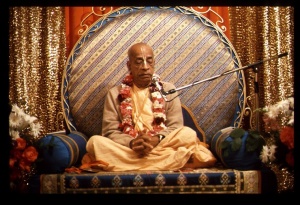SB 1.18.43: Difference between revisions
m (1 revision(s)) |
No edit summary |
||
| Line 1: | Line 1: | ||
{{info | {{info | ||
|speaker= | |speaker=Śṛṅgi's father, the Ṛṣi | ||
|listener= | |listener=Śṛṅgi the brāhmaṇa boy | ||
}} | }} | ||
[[Category:Srimad-Bhagavatam - Canto 01 Chapter 18]] | |||
[[Category:Bhagavatam Verses Spoken by Srngi's Father - Vanisource|011843]] | |||
<div style="float:left">'''[[Srimad-Bhagavatam]] - [[SB 1|First Canto]] - [[SB 1.18: Maharaja Pariksit Cursed by a Brahmana Boy|Chapter 18: Mahārāja Parīkṣit Cursed by a Brāhmaṇa Boy]]'''</div> | |||
<div style="float:right">[[File:Go-previous.png|link=SB 1.18.42]] '''[[SB 1.18.42]] - [[SB 1.18.44]]''' [[File:Go-next.png|link=SB 1.18.44]]</div> | |||
{{CompareVersions|SB|1.18.43|SB 1965|SB 1972-77}} | |||
{{RandomImage}} | |||
==== TEXT 43 ==== | ==== TEXT 43 ==== | ||
<div class="verse"> | |||
<div | :alakṣyamāṇe nara-deva-nāmni | ||
alakṣyamāṇe nara-deva-nāmni | :rathāṅga-pāṇāv ayam aṅga lokaḥ | ||
rathāṅga-pāṇāv ayam aṅga lokaḥ | :tadā hi caura-pracuro vinaṅkṣyaty | ||
tadā hi caura-pracuro vinaṅkṣyaty | :arakṣyamāṇo 'vivarūthavat kṣaṇāt | ||
arakṣyamāṇo 'vivarūthavat kṣaṇāt | |||
</div> | </div> | ||
| Line 18: | Line 23: | ||
==== SYNONYMS ==== | ==== SYNONYMS ==== | ||
<div class="synonyms"> | |||
<div | ''alakṣyamāṇe''—being abolished; ''nara-deva''—monarchical; ''nāmni''—of the name; ''ratha-aṅga-pāṇau''—the representative of the Lord; ''ayam''—this; ''aṅga''—O my boy; ''lokaḥ''—this world; ''tadā hi''—at once; ''caura''—thieves; ''pracuraḥ''—too much; ''vinaṅkṣyati''—vanquishes; ''arakṣyamāṇaḥ''—being not protected; ''avivarūtha-vat''—like lambs; ''kṣaṇāt''—at once. | ||
</div> | </div> | ||
| Line 26: | Line 30: | ||
==== TRANSLATION ==== | ==== TRANSLATION ==== | ||
<div class="translation"> | |||
<div | |||
My dear boy, the Lord, who carries the wheel of a chariot, is represented by the monarchical regime, and when this regime is abolished the whole world becomes filled with thieves, who then at once vanquish the unprotected subjects like scattered lambs. | My dear boy, the Lord, who carries the wheel of a chariot, is represented by the monarchical regime, and when this regime is abolished the whole world becomes filled with thieves, who then at once vanquish the unprotected subjects like scattered lambs. | ||
</div> | </div> | ||
| Line 34: | Line 37: | ||
==== PURPORT ==== | ==== PURPORT ==== | ||
<div class="purport"> | |||
According to [[Srimad-Bhagavatam|''Śrīmad-Bhāgavatam'']] the monarchical regime represents the Supreme Lord, the Personality of Godhead. The king is said to be the representative of the Absolute Personality of Godhead because he is trained to acquire the qualities of God to protect the living beings. The Battle of Kurukṣetra was planned by the Lord to establish the real representative of the Lord, Mahārāja Yudhiṣṭhira. An ideal king thoroughly trained by culture and devotional service with the martial spirit makes a perfect king. Such a personal monarchy is far better than the so-called democracy of no training and responsibility. The thieves and rogues of modern democracy seek election by misrepresentation of votes, and the successful rogues and thieves devour the mass of population. One trained monarch is far better than hundreds of useless ministerial rogues, and it is hinted herein that by abolition of a monarchical regime like that of Mahārāja Parīkṣit, the mass of people become open to many attacks of the age of Kali. They are never happy in an overly advertised form of democracy. The result of such a kingless administration is described in the following verses. | |||
</div> | |||
<div | |||
<div style="float:right; clear:both;">[[File:Go-previous.png|link=SB 1.18.42]] '''[[SB 1.18.42]] - [[SB 1.18.44]]''' [[File:Go-next.png|link=SB 1.18.44]]</div> | |||
</div> | __NOTOC__ | ||
__NOTOC__ | __NOEDITSECTION__ | ||
Revision as of 03:17, 3 May 2021

A.C. Bhaktivedanta Swami Prabhupada
TEXT 43
- alakṣyamāṇe nara-deva-nāmni
- rathāṅga-pāṇāv ayam aṅga lokaḥ
- tadā hi caura-pracuro vinaṅkṣyaty
- arakṣyamāṇo 'vivarūthavat kṣaṇāt
SYNONYMS
alakṣyamāṇe—being abolished; nara-deva—monarchical; nāmni—of the name; ratha-aṅga-pāṇau—the representative of the Lord; ayam—this; aṅga—O my boy; lokaḥ—this world; tadā hi—at once; caura—thieves; pracuraḥ—too much; vinaṅkṣyati—vanquishes; arakṣyamāṇaḥ—being not protected; avivarūtha-vat—like lambs; kṣaṇāt—at once.
TRANSLATION
My dear boy, the Lord, who carries the wheel of a chariot, is represented by the monarchical regime, and when this regime is abolished the whole world becomes filled with thieves, who then at once vanquish the unprotected subjects like scattered lambs.
PURPORT
According to Śrīmad-Bhāgavatam the monarchical regime represents the Supreme Lord, the Personality of Godhead. The king is said to be the representative of the Absolute Personality of Godhead because he is trained to acquire the qualities of God to protect the living beings. The Battle of Kurukṣetra was planned by the Lord to establish the real representative of the Lord, Mahārāja Yudhiṣṭhira. An ideal king thoroughly trained by culture and devotional service with the martial spirit makes a perfect king. Such a personal monarchy is far better than the so-called democracy of no training and responsibility. The thieves and rogues of modern democracy seek election by misrepresentation of votes, and the successful rogues and thieves devour the mass of population. One trained monarch is far better than hundreds of useless ministerial rogues, and it is hinted herein that by abolition of a monarchical regime like that of Mahārāja Parīkṣit, the mass of people become open to many attacks of the age of Kali. They are never happy in an overly advertised form of democracy. The result of such a kingless administration is described in the following verses.